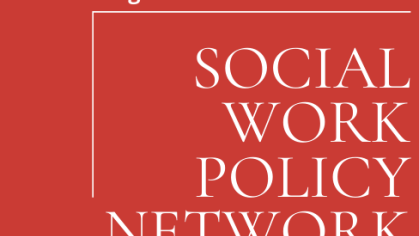By: Shreya Gupta
We recently had the opportunity to speak with MSW student Halle Sentman about her background at Rutgers School of Social Work, her field placement at NJ's District 11 office, and her thoughts on this year's Social Work Month theme.
Q: Can you share a bit about your background and how you came to Rutgers School of Social Work?
A: I credit Bryan Stevenson's Just Mercy: A Story of Justice & Redemption as what turned me towards social work as a career. When I met him at my first undergraduate institution as a French studies student, I was inspired by his journey of helping wrongly convicted individuals who were on death row and realized I wanted to be in the rewarding field of social work. I decided to enroll at Rutgers School of Social Work to complete my BA in Social Work and am currently an MSW student at the School pursuing the MAP specialization with an Aging and Health Certificate.
Q: Why did you choose to pursue the MAP specialization and Aging and Health Certificate?
A: During my undergraduate social work studies, my first field placement was clinical in nature, and as I completed it, I realized there were limitations on the ways in which I had hoped to help others. The MAP specialization allows me to influence the policies that impose such boundaries on clinicians, which is an exciting prospect to me.
My mother's career working with elderly populations is what fostered my interest in the aging and health sector. Spending time in assisted-living facilities and nursing homes, I was exposed to the hardships older adults face and realized that there were many changes in public policy and beyond that needed to be implemented in order to improve their lives. The Aging and Health Certificate will enable me to create those changes.
Q: How were you connected to your field placement and what does it consist of?
A: Until I met with my field coordinator, Mariann Bischoff, I was under the impression that most internships were clinically-based. When I expressed my deep interest in public policy to her, she connected me with the legislative office of New Jersey's District 11. It was very exciting to learn that I had been selected for placement there after my interview.
My placement consists of an end-of-semester project in which interns have to probe an area of public policy where they want to create change, and then propose a bill in reference to that policy. Because of my interest in aging and health, I researched current programs in place that supported caregivers and wasn't able to find many. Thus, I proposed a bill which stated that those who house an older adult would receive a tax incentive. I chose this in order to prevent the premature institutionalization of older adults, as this can lead to further health complications and alienate them from their communities. By providing caregivers with a tax incentive, not only would it relieve the financial strain that accompanies such a role, but it would also promote more people to assume such responsibilities.
I presented my proposal to legislators at the office, and they expressed their interest in working with me. They sent me a draft of the bill, and I am currently in the process of discussing the amendments I want to implement with them, revising the bill, and sending it back for revisions. Once the bill reaches the position I want it to, the senators and assembly members can introduce it to their respective houses, and voting can take place.
Q: How has it been navigating this entire field placement virtually?
A: Despite being virtual, it has been a rewarding experience as I've been able to immerse myself in the world of policymaking. I've learned about the ways in which a bill should be curated in order to increase its likelihood to be passed. It is incredible to think that my hard work on this bill will be coming to fruition and will improve the lives of caregivers and older adults alike.
Q: What advice would you give to students that are interested in becoming changemakers in the public policy realm?
A: I would advise them to advocate for themselves. You must seek out the opportunities you are most interested in and express your passion to those who can connect you to such experiences. There will also be many incidents in which people will attempt to influence your outlook on ideas, but it is important to remain unwaveringly passionate about what you stand for and what changes you want to see in the world.
Q: This year's Social Work Month theme is "Social Workers are Essential." What does this mean to you?
A: Many people believe that we are only involved in alleviating a narrow scope of issues in a small population's lives, but social workers can be advocates for a wide variety of problems, such as public policy reformation. Our work doesn't only reach individuals, but also expands into communities, and without social workers, there would be many unresolved troubles in society. The COVID-19 pandemic has unveiled the importance of social workers in assisting people with meals, housing, finances, and mental health. I hope people are able to see the important role we social workers play in society.



